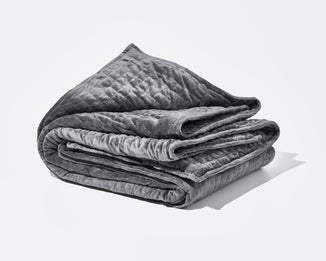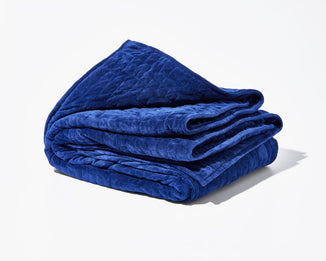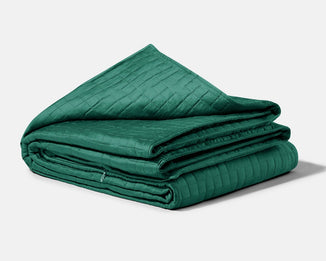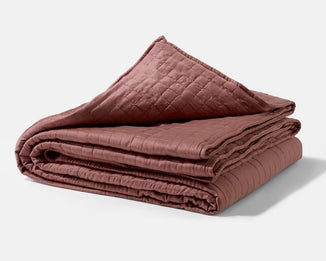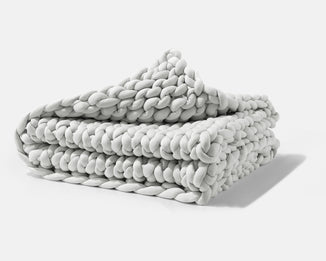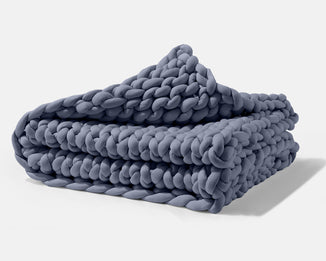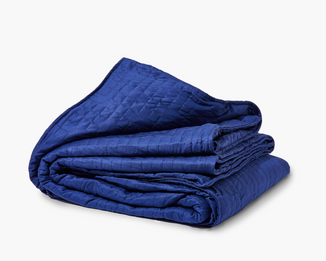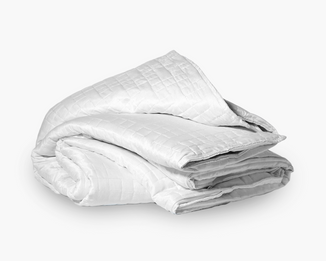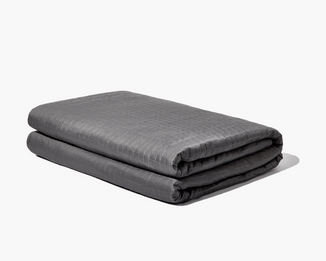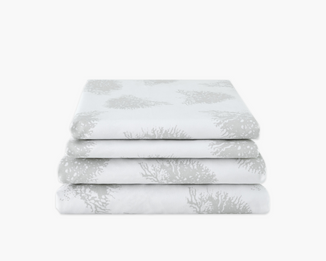
May 20, 2022
Using a Weighted Blanket for PTSD: Everything You Need to Know
Almost all of us will experience or witness a traumatic event at some point in our lives. Trauma can take many forms: abuse, war, natural disasters, accidents or the death of a loved one. While many people recover from such events naturally, others go on to develop long-term symptoms — heightened reactions, anxiety, depressed mood and agitation — that lead to a diagnosis of post-traumatic stress disorder (PTSD).

In recent years, weighted blankets have emerged as a complementary treatment for PTSD. Known for their stress-relieving, sleep-inducing benefits, these therapeutic blankets induce a sense of calm and comfort that may be highly beneficial in improving PTSD symptoms.
In this guide, we discuss PTSD, its symptoms and how cozying up to a high-quality weighted blanket can help some trauma sufferers get relief.
What Is PTSD?
PTSD is a serious mental health disorder that develops after a person experiences or witnesses a shocking, dangerous or unexpected event. It’s estimated that PTSD affects 3.6 percent of the U.S. population, approximately nine million people each year.

Examples of things that can cause PTSD include:
- Sexual or physical assault
- Combat exposure
- Childhood physical abuse
- Being threatened with a weapon
- An accident
Symptoms of PTSD
Symptoms of PTSD will vary from person to person. However, many people with PTSD experience frightening thoughts, insomnia, flashbacks, low self-esteem and unpleasant emotions.
Other symptoms may include:
- Flashbacks and intrusive memories
- Nightmares, insomnia and sleep disturbances
- Anxiety and depression
- Feeling disconnected from loved ones
How Can Weighted Blankets Help with PTSD?
Getting effective treatment is critical to improving PTSD symptoms, healing from past trauma and feeling safe in the world. Unfortunately, many trauma survivors don’t respond well to conventional therapies or may be reluctant to seek professional help in the first place.
Weighted blankets, while not a first-line treatment for PTSD, are one emerging complementary treatment option for trauma survivors. These cozy blankets use “deep touch pressure stimulation,” a scientifically proven mechanism that applies firm but gentle pressure to the body, similar to being hugged. This soothing pressure activates the parasympathetic nervous system, triggering the release of relaxation-inducing hormones that make the user feel safe, relaxed and comfortable.
Here are some other ways people living with PTSD may benefit by using a weighted blanket.
- Alleviates Anxiety and Panic Attacks – Many people with PTSD experience recurrent panic attacks — waves of intense fear followed by a racing heart, sweating, dizziness and other unpleasant physical symptoms. Weighted blankets can help you get through these scary episodes by calming your heart rate and breathing when you’re feeling anxious. They also help decrease cortisol, the body’s primary stress hormone that can create additional anxiety when chronically elevated.

- Promotes a Better Night’s Sleep – Insomnia and nightmares frequently co-occur with PTSD. The worst part is that a lack of sleep can make PTSD symptoms worse, leading to a vicious cycle that’s often difficult to break. Weighted blankets are one possible solution. Not only are weighted blankets scientifically proven to reduce insomnia severity in people with psychiatric disorders, but they can also be a source of comfort for those dealing with frequent night terrors.
Tip: Are you looking for a weighted blanket to help you get a better snooze? Check out our best-selling Gravity Weighted Blanket — the only weighted blanket studied and proven to improve sleep quality!
Get Your Gravity Weighted Blanket
- Eases Symptoms of Depression – If PTSD has you feeling down, spend some time relaxing under a weighted blanket. The gentle pressure provided by a weighted blanket is thought to stimulate the release of serotonin and dopamine — two neurotransmitters that play important roles in regulating happiness and mood.
- Helps You Cope During Therapy – Going to therapy can be difficult for anyone, but it’s especially challenging for those with PTSD. People with PTSD may need to confront unpleasant or painful emotions and memories during therapy, making them more likely to experience dissociation. With their ability to mimic a hug, weighted blankets can serve as a source of comfort during such instances when memories of past trauma resurface.
Things to Consider When Choosing a Weighted Blanket for PTSD
When choosing a weighted blanket for PTSD, consider keeping the following in mind:
- Weight. Weighted blankets come in a range of sizes and weights. The general rule of thumb is to pick one that’s about 10 percent of your body weight. People with PTSD may want to go even lighter to avoid feeling trapped or claustrophobic.
- Fabric. If your PTSD symptoms frequently leave you feeling hot and sweaty, go with a cooling weighted blanket. Our special cooling weighted blanket is made from revolutionary moisture-wicking fabrics to help keep you cool and comfortable all night long!
- Ease of Care. Finally, don’t forget to buy a duvet cover for your weighted blanket. On top of making your weighted blanket easier to clean, a high-quality duvet cover will keep your weighted blanket in good condition for years to come.
Level-Up Your Self-Care
Traumatic experiences are an inevitable part of human existence, but not everyone manages to come out the other side unscathed. Some people go on to develop symptoms of PTSD that severely impact their relationships, self-confidence and ability to function normally. Weighted blankets, while not a suitable replacement for professional therapy, can be a wonderful complement to your PTSD treatment plan.
Your use of this website, its content, and any products obtained through this website is at your own risk. This website, its content, and any products obtained through this website are provided on an “as is” basis, without any warranties of any kind, either express or implied, including warranties of merchantability, infringement of intellectual property, or fitness for any particular purposes. No warranty or representation is made with respect to the completeness, reliability, quality, or accuracy of this website or its content. This website, its content, and any products obtained through this website do not constitute medical treatment and is not a substitute for a medical examination or diagnosis. If you are dealing with a health condition check with your health care provider before using. This website may contain affiliate links that allow us to earn a commission on purchases made through such links. We may accept forms of advertising or sponsorships in connection with this website. There might also be paid topic insertions. We may accept and keep free products, services, and other forms of compensation from others.
